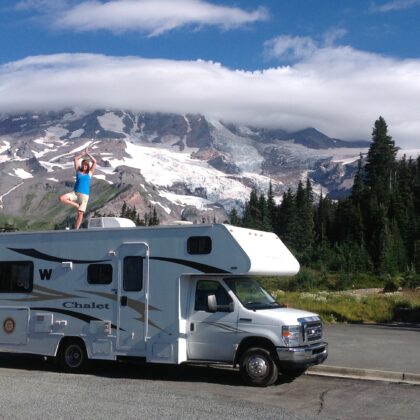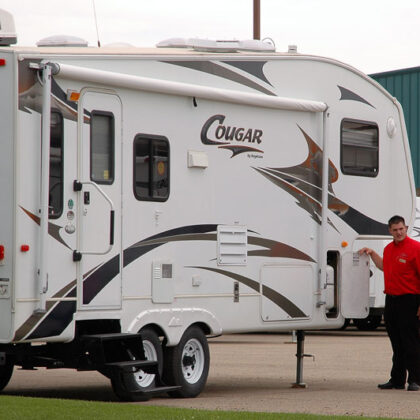Embarking on the RV lifestyle is an exhilarating experience, offering the freedom to explore new places at your own pace while bringing the comforts of home along for the ride. However, the excitement of the open road also comes with its own set of responsibilities.

Among the many preparations required for a successful trip, ensuring you have all the necessary documents is often overlooked, but is absolutely crucial for being prepared to hit the open road.
Whether you’re a seasoned RVer or gearing up for your first journey, having the right paperwork on hand can save you from potential headaches and help you navigate any situation that might arise.
In this post, we’ll cover the essential documents you should bring with you in your RV, ensuring you’re well-prepared for a smooth and enjoyable adventure.
1. Driver’s License and Vehicle Registration
Your driver’s license and vehicle registration are essential for operating your RV legally. If you’re a part-time RVer, double-check that your license is valid for the entire trip, especially if you’re crossing state lines or borders. Some states have specific requirements for larger RVs, such as special endorsements or permits, so make sure you check your state’s regulations if your RV is over 26,000 lbs or 40ft. Keeping your vehicle registration in a waterproof document holder is a smart move to ensure it stays safe and accessible.
2. Proof of Insurance
Whether it’s RV insurance or health insurance, having proof of coverage is vital. Ensure your RV insurance policy covers not only accidents, but also personal belongings, roadside assistance, and liability. Likewise, confirm that your health insurance covers out-of-state travel. If not, consider travel health insurance to avoid unexpected medical expenses. Keep digital and physical copies of both insurance policies for easy access.
3. Passport and Travel Visas
If your RV adventure takes you across international borders—whether to Canada, Mexico, or further afield—don’t forget to bring your passport. Even if you’re staying within the country, a passport can serve as a secondary form of ID. Make sure it’s valid for the entire trip, and check the requirements for any visas you might need.
4. Emergency Contact Information
It’s crucial to have emergency contact information readily available while on the road. Create a list that includes the contact details for family members, doctors, roadside assistance, and even local authorities in the regions you’re visiting. Store this list both physically and digitally in a secure, easily accessible location.
5. Health Records
Your health records can be a lifesaver in an emergency. Carry a list of any current medications, allergies, and medical conditions. Additionally, bring copies of prescriptions in case you need refills while on the road. Many RV travelers also opt to store their health records digitally in secure apps for easy access.
6. RV Manuals and Warranties
Having your RV owner’s manual and any applicable warranty documents on hand can be invaluable if you run into trouble with your RV or appliances. RVs typically come with a bag full of manuals for your various RV appliances – be sure you have those resources tucked away somewhere in your RV, as inevitably, something will break. These documents might help you quickly troubleshoot some issues and ensure you’re aware of any coverage for repairs or replacements.

7. Work Agreement
Before you hit the road, ensure you have printed or digital copies of the work agreement provided by your employer (or the one you made up that you had signed by your employer). Having this easily accessible helps avoid any confusion or disputes when you arrive at your new Workamping job.
8. Travel Itinerary
Even if you prefer spontaneous adventures, having a basic travel itinerary is essential for planning your stops and navigating efficiently. Include addresses, contact information, and alternative routes in case of road closures. You don’t want to end up needing your phone’s GPS app in an area with no cell service! Sharing this itinerary with a friend or relative ensures someone knows where you’ll be, adding an extra layer of safety.
9. Copies of Important Legal Documents
While you may not expect to need them, it’s smart to bring copies of important legal documents such as your will, power of attorney, or advanced directives. Store these in a secure, waterproof or fireproof container, especially if you’ll be traveling for an extended period or crossing borders.
10. Digital Copies of Documents
In today’s digital world, having digital backups of all your important documents is a must. Scan and save these documents to a secure cloud storage service or encrypted USB drive. This ensures that even if physical copies are lost or damaged, you’ll have access to everything you need.
11. Pet Documentation
If you’re traveling with pets, don’t forget their vaccination records and health certificates. A few RV parks, campgrounds, and even border authorities may require proof of vaccinations. Keeping your pet’s paperwork up to date will ensure smooth travels with your furry friends.
12. Financial Information
Carrying a secure, up-to-date list of your financial account numbers, bank contact information, and credit card details is essential. To protect against identity theft, ensure this information is kept secure, either in a physical lockbox or with a password-protected digital storage option. Also, let your bank know about your plans to be away from your domicile state/home base to prevent any unexpected issues with your cards while you’re on the road.
As you prepare to hit the road and embrace the adventure of RV travel, it’s easy to focus on the excitement of the journey ahead. However, taking the time to organize and pack the essential documents outlined in this post will provide you with peace of mind, knowing you’re ready for whatever the road may bring.
From ensuring your legal and financial matters are in order to having quick access to health records and pet documentation, these preparations will help you navigate any unexpected situations with confidence.
Remember, the more prepared you are, the more you can relax and enjoy the unique experiences that RV travel offers.
Thanks for reading the Gone Workamping blog from Workamper News. Join Workamper.com today to see all the new job opportunities for RVers, as well as the training and resources to confidently find the right Workamping job for you – easily and securely.






